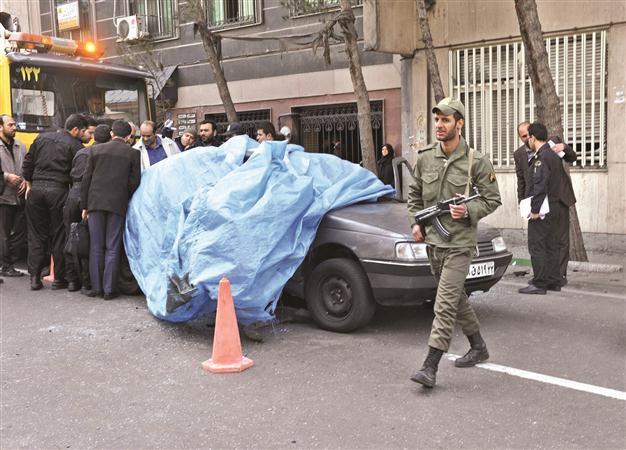Iran scientist’s killing adds to nuke tensions
TEHRAN - The Associated Press

A policeman walks past the attacked car belonging to Iranian nuclear scientist Mostafa Ahmadi-Roshan at a blast site in Tehran. Reuters photo
An Iranian nuclear scientist was killed in a
Tehran car bombing yesterday, which the Islamic republic immediately blamed on
Israel and the U.S., worsening a tense international standoff over its atomic program.
Vice President
Mohammad Reza Rahimi told state television the attack would not stop Iran making “progress” in its nuclear activities. Iranian officials said the assassination method – two men on a motorbike attaching a magnetic
bomb to the target’s vehicle – was similar to that used in the killings of three other of its scientists over the past two years.
Mostafa Ahmadi Roshan, 32, died immediately in the blast, which occurred in front of a university campus in east Tehran. His driver and bodyguard later died from his wounds, the Fars news agency reported. Roshan was a deputy director at Iran’s Natanz uranium enrichment facility, according to the website of Sharif University, where he graduated a decade ago. Roshan specialized in making polymeric membranes to separate gas. Iran uses a gas separation method to enrich its uranium. Iran’s atomic energy organization issued a statement confirming Roshan “was working in the nuclear industry,” according to Iran’s Arabic broadcaster Al-Alam. “The futile actions by the criminal Israeli regime and the U.S. will not disrupt the path the Iranian people have chosen,” it said, adding that nuclear activities will continue.
‘Scientists more determined’“This terrorist act was carried out by agents of the Zionist regime [Israel] and by those who claim to be combating terrorism [the U.S.] with the aim of stopping our scientists from serving [Iran],” the vice president, in charge while President Mahmoud Ahmadinejad wraps up a Latin America tour, told state television. “[Israel and the U.S.] should know that Iranian scientists are more determined than ever in striding towards Iran’s progress.” Israel’s military chief of General Staff Lt. Gen. Benny Gantz told MPs on Jan. 10 that 2012 was to be “a critical year” given Iran’s nuclear drive, international pressure “and things which happen to [the Iranians] in an unnatural way,” Israeli media reported.
A day before the
killing, Russia expressed regret and concern about Iran’s launch of uranium enrichment up to 20 percent at an underground facility but urged all parties involved in the nuclear standoff with Tehran to avoid hasty moves. A Russian Foreign Ministry statement said the launch of the work at the facility near Iran’s holy city of Qom demonstrated Tehran was continuing to ignore international concerns about its nuclear program. The Danish presidency of the EU also said yesterday it was confident harsher European sanctions against Iran over its nuclear program, targeting not only its oil sector but also its central bank, would be decided later this month.
Three other Iranian scientists were killed in 2010 and 2011 when their cars blew up in similar circumstances. At least two of the scientists had also been working on nuclear activities. The blast killed Roshan, a chemistry expert and a director of the Natanz uranium enrichment facility in central Iran, state TV reported. State news agency IRNA said Roshan had “organizational links” to Iran’s nuclear agency, which suggests a direct role in key aspects of the program.
TURKEY’S HORMUZ WARNING
ANKARA - Hürriyet Daily News
Turkey’s Energy Minister Taner Yıldız said he did not want the Strait of Hormuz to close. “I do not wish for the closure of the Strait of Hormuz as it will have negative consequences for Turkey. A possible climate of war would not serve the countries in the region or the world. But I do not think things will get worse,” Yıldız said. “Countries should be even more careful in an environment where the Arab Spring caused a 1.6 percent decline in overall oil production and increased prices by 10 percent,” Anatolia news agency quoted Yıldız as saying.
